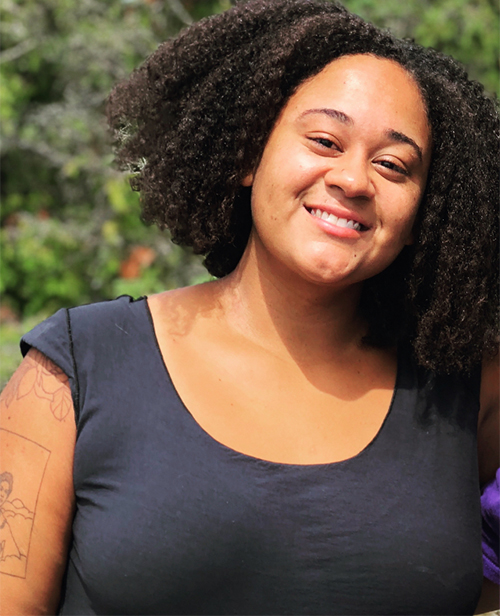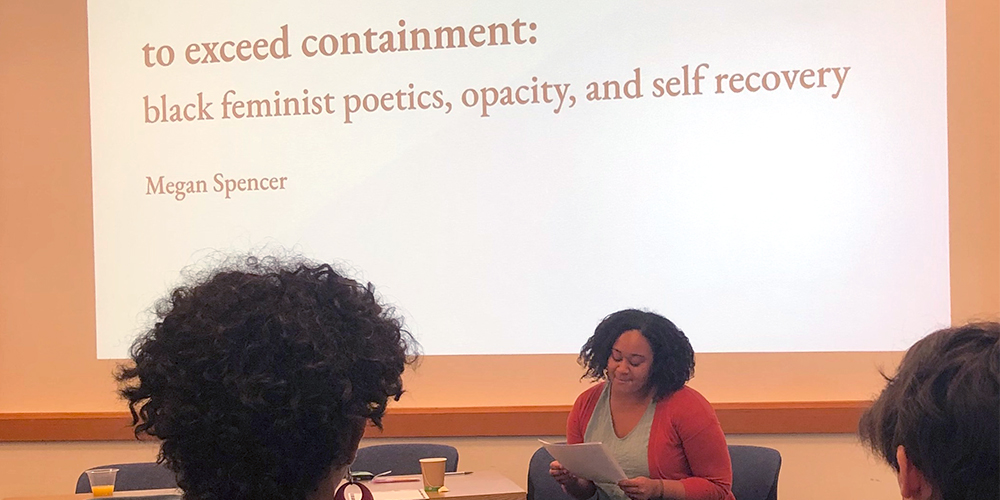Megan Spencer: Advocating for justice and liberation

Graduated
RCAH Class of 2011
Degrees
- Arts and Humanities from RCAH
- Double Major: Women's and Gender Studies
- Master's in Women, Gender, and Sexuality Studies from Oregon State University
Career
Currently a Ph.D. student in feminist studies with an emphasis in black studies at UC Santa Barbara
Background and Location
- Grew up in Grand Rapids, Michigan
- Graduated from Creston High School
- Lives in Santa Barbara, California
Hi, Megan! We’re curious: When you were in high school in Grand Rapids, what drew you to RCAH?
I was interested in learning more about social justice and being able to learn about how various social issues overlap.
How did RCAH prepare you for your work life and graduate school?
RCAH definitely helped me to think critically and also made me a stronger writer, but more than that I think it helped shaped my way of thinking about being in the world in terms of responsibility and relationality.
Can you tell us about something in college that particularly influenced you?
Being involved with the Refugee Development Center through an RCAH course led me to become an intern there, and this is an experience that really made me more aware of how to be more in solidarity with immigrant and refugee communities, and also to think about the historical and ongoing processes that cause people to become refugees.
"RCAH definitely helped me to think critically
and also made me a stronger writer, but more than that I think it helped shaped my way of thinking about being in the world in terms of responsibility and relationality."
Do you recall some classes or professors that were really memorable for you?
There are so many. One of the most significant was a course I took with Professor Terese Monberg during my first year. I remember writing about ecofeminism and globalization, and although my thoughts and ideas have evolved, so much of my current research is still concerned with asking some of the same questions I was thinking about in that class.
I also took classes about gender with Dr. Patti Rogers that were really insightful for me, in addition to Professor Miner’s course on print making and social justice. I still think about this course in relation to my own art practice today. Professor Torres and Professor Skeen were also really influential for me.
I think in general it was powerful for me to have professors who were women and people of color doing academic work that was concerned with addressing injustice. So many of these courses and professors really helped me to think about my own position in the world and also helped me to imagine the academy as a space that I could do that kind of work.
You’re pursuing your Ph.D. right now. Tell us a little about that.
I’m a Ph.D. student in feminist studies with an emphasis in black studies at UC Santa Barbara. I do research on black feminist theory, ecological humanities, black queer and feminist art and literature. I also teach undergraduate level feminist studies courses, and I just started working part-time for a non-profit housing organization working with children and families experiencing homelessness.
How long have you been there?
2 years
What were you doing before returning to school?
Before starting my Ph.D., I did advocacy and LGBTQ community outreach for a domestic violence program in Portland, Oregon. Prior to my master’s, I worked in early childhood education in Detroit, Michigan.

Can you talk a little about how the arts, humanities, and community engagement still play a role in your life today?
The work I do now is very much based in interdisciplinary humanities and thinking about questions of justice and liberation. This is central not just to my research but to my life in general. Making art is something I see a lot of radical potential in, and I try to make time for this in my own self-care as much as possible. My previous work doing anti-violence advocacy was very community-based, and missing this kind of work is what lead me to begin working for a non-profit in Santa Barbara.
Is there anything else you would like to add about your college experience?
It was a positive experience for me. I hope that more students of color are able to become involved because I think that the kind of curriculum the RCAH creates can be really important and healing for students of color if they’re able to find community with each other in the RCAH.

